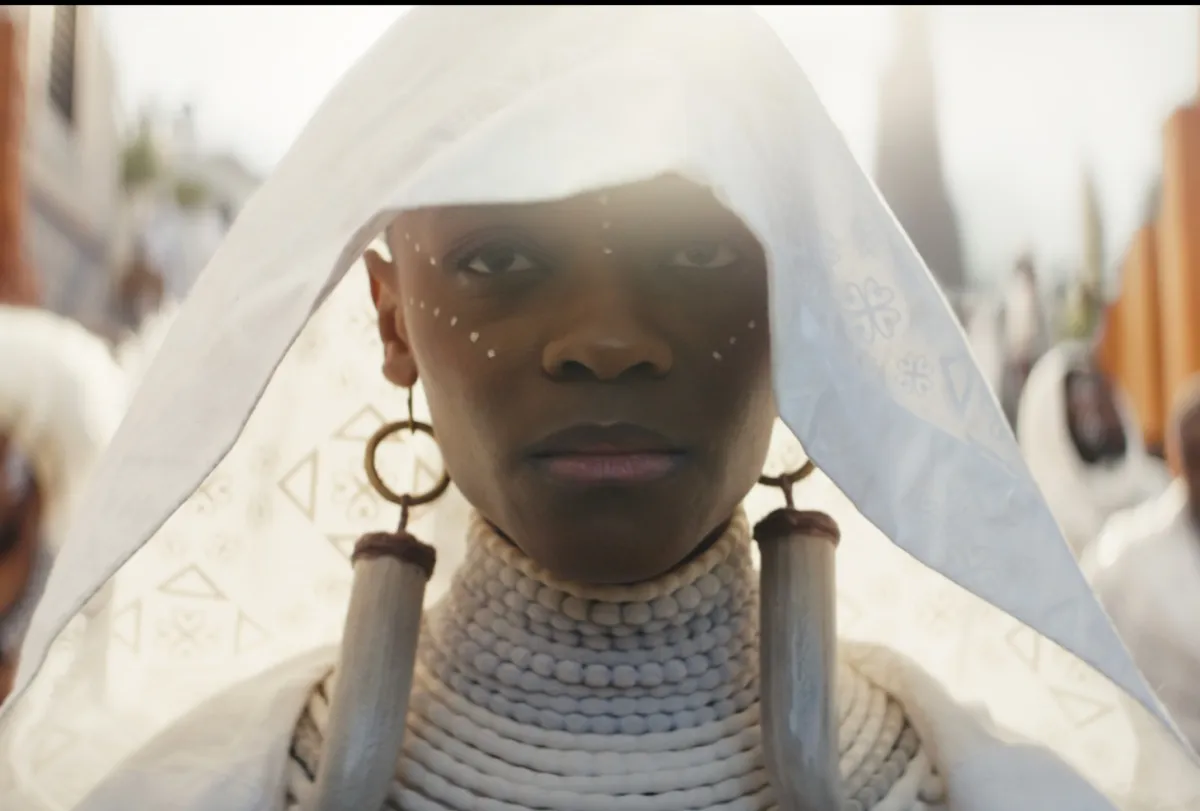It has been four years since we have seen Marvel’s Wakanda under the creative direction of Ryan Coogler. In Black Panther: Wakanda Forever, Coogler was faced with not only paying tribute to Chadwick Boseman, who played T’Challa/Black Panther, after his death, but also incorporating that loss into the story itself. On top of that, they were also introducing one of Marvel’s most iconic anti-heroes and exploring Wakanda’s future without him. And Coogler sticks the landing.
There is no denying that things probably got shaken up by the loss of Boseman, but the turmoil of that loss is expressed well by Shuri (Letitia Wright), who waffles between rage, denial, and isolation. Meanwhile, Queen Ramonda (Angela Bassett) is the queen mother of Wakanda, ruling following the death of her son. Forces in the West, specifically America and France, are trying to steal vibranium from the Wakandans or find it elsewhere—which leads an American team to the aquatic resources of Namor (Tenoch Huerta). While the threat is neutralized, Namor approaches Shuri and Ramonda, telling them that T’Challa’s opening of Wakanda to the world brought vibranium to the attention of the world, threatening his kingdom, Talokan, which drives the film’s main conflict.
For those who are used to seeing Namor as the king of Atlantis, that is changed very much in this film, which makes him the ruler of a Mesoamerican underwater kingdom called Talokan, based on the Aztec mythological place. Still, his anti-hero tendencies, charm, and mutant identity remain intact. Huerta plays him dynamically, making the character understandable despite being an antagonist. Those who felt Killmonger was right will have even stronger arguments about Namor, mainly because his origin story directly positions his existence, as well as that of Talokan, in response to the epidemic of smallpox brought over by Spanish colonizers. Once again, Wakanda is in conflict with a person impacted by imperialism and colonization who therefore acts cynically toward the outside world that the Wakandans don’t fully relate to.
Riri Williams, as played by Dominique Thorne, who finds herself wrapped up in their conflict, is perfect, speaking as someone who has loved Ironheart in theory and enjoyed watching her get fleshed out entirely through the work of Eve Ewing and Kevin Libranda. She and Shuri have great banter and camaraderie. There is something that warms my heart to see that the two most intelligent people in the Marvel Cinematic Universe are young Black women. Coogler’s cast is primarily women, and with Shuri our de facto lead, it is up to Letitia Wright to sell it … and she does. Despite souring on her slightly when she spread anti-vaccine information, there is no denying she is an excellent leading woman. I would go so far as to say that Wakanda Forever is probably the best female-led superhero movie we have to date. This isn’t surprising because Black Panther (IMO) was better at female representation than Wonder Woman or Captain Marvel.
The most exciting part of the narrative, for me, was watching Shuri deal with her grief, which impacted her and her family’s decisions around Namor as a threat. While these two powerful Black and Indigenous nations are fighting, the CIA, where we get our token white character of Everett K. Ross (Martin Freeman), and the American government are planning to destabilize Wakanda to try to take the resources—something that isn’t concluded by the end of this film but leaves a lingering haunting feeling.
Black Panther: Wakanda Forever is under a lot of pressure, but Coogler lands it. The performances are strong, and the stakes feel natural and internal. Even when you know it is getting a little long in the tooth, it is more a matter of not wanting to leave for the bathroom and missing something. For people dealing with Marvel fatigue, this is the film that will give you some hope. Black Panther 2 will end the MCU’s turbulent Phase 4, so at least that helps them stick the landing.
(featured image: Marvel Entertainment)










Published: Nov 8, 2022 12:00 pm